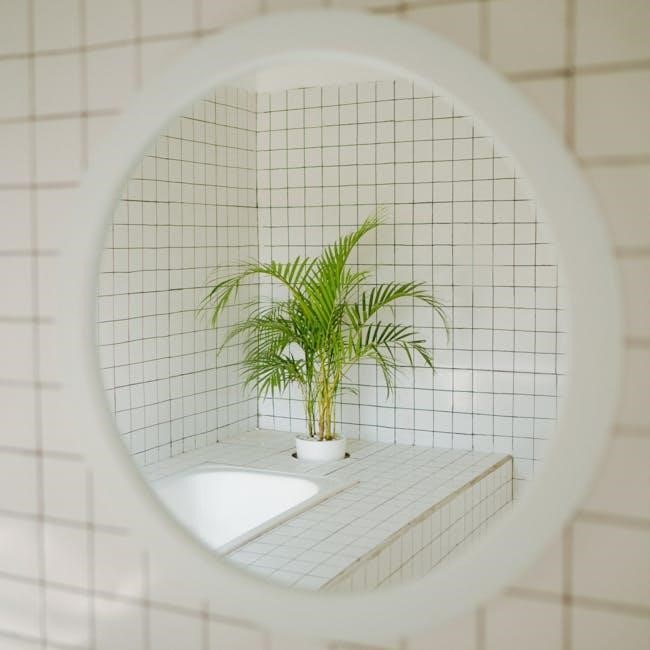
the clean house by sarah ruhl pdf
Sarah Ruhl’s The Clean House is a fresh, funny romantic comedy blending magical realism with witty dialogue, set in metaphysical Connecticut, exploring love, identity, and quirky relationships.
Background of the Play
The Clean House, written by Sarah Ruhl in 2004, is a romantic comedy infused with magical realism. Set in a metaphysical Connecticut, the play explores themes of love, identity, and relationships through quirky characters. Ruhl’s inventive style blends humor with poignant emotion, creating a unique theatrical experience. The play follows Lane, a career-oriented doctor, and her Brazilian maid, Matilde, whose unconventional approach to life and cleaning sparks a journey of self-discovery. Originally produced at Lincoln Center Theater, it has since been performed nationwide, earning acclaim for its inventive storytelling and emotional depth.
Sarah Ruhl’s Style and Themes
Sarah Ruhl’s unique style blends magical realism with romantic comedy, creating a captivating narrative voice. Her plays often defy categorization, merging comedy and tragedy, absurdity, and poignant emotion. Themes of love, identity, and self-discovery are central, with a focus on relationships and emotional depth. Ruhl’s inventive storytelling and poetic dialogue explore the human condition, making her work both thought-provoking and deeply relatable. Her ability to weave quirky humor with profound insight sets her apart as a contemporary playwright, earning her critical acclaim and a loyal audience.
Why “The Clean House” is Significant
The Clean House stands out for its unique blend of magical realism, humor, and poignant emotion, offering a fresh perspective on romantic comedy. Its exploration of themes like love, identity, and grief resonates deeply, while its quirky characters and inventive storytelling set it apart. The play’s ability to balance absurdity with emotional depth has earned it critical acclaim and a loyal audience, making it a significant work in contemporary theater. Its innovative style and universal themes ensure its lasting impact on both stage and literature;

Plot Summary of “The Clean House”
In metaphysical Connecticut, a career-oriented doctor, Lane, hires a quirky Brazilian maid, Matilde, who dislikes cleaning. The story unfolds with humor, love, and emotional depth, exploring complex relationships and unexpected events that challenge the characters’ lives and identities.
Setting: Metaphysical Connecticut
Metaphysical Connecticut serves as the unique backdrop for The Clean House, blending the realism of a suburban home with a surreal, dreamlike atmosphere. The setting transcends physical space, creating a realm where the characters’ inner worlds and emotions manifest outwardly. This imaginative locale allows for the exploration of complex themes like love, grief, and identity, while maintaining a sense of familiarity through its Connecticut roots. The interplay between the mundane and the magical defines the play’s distinctive setting.
Main Characters: Lane, Matilde, Virginia, and Ana
Lane is a career-driven doctor, practical yet emotionally reserved, who struggles with balancing her professional and personal life. Matilde, the quirky Brazilian maid, brings humor and wisdom, avoiding cleaning to focus on perfecting jokes. Virginia, Lane’s sister, is a rival who obsessively cleans to cope with her own emptiness. Ana is the enigmatic figure who disrupts their lives, embodying mystery and transformation. Together, these characters navigate love, identity, and grief, creating a dynamic interplay that drives the story forward.
Key Events and Narrative Structure
The play unfolds in a metaphysical Connecticut, blending comedy and tragedy. Key events include Matilde’s arrival as Lane’s maid, Virginia’s obsessive cleaning, and Ana’s mysterious presence. Lane’s marriage is disrupted, leading to emotional confrontations. The narrative explores love, loss, and identity through these interactions, with a notable tree-hunting expedition adding depth. Ruhl’s structure masterfully intertwines humor with poignant moments, creating a unique storytelling experience that captivates audiences and sparks reflection on life’s complexities.

Themes in “The Clean House”
Love, identity, grief, and class are central themes, intertwined with cleaning and storytelling as metaphors for life’s complexities, blending emotional depth with humor and wit.
Love and Romantic Relationships
Love in The Clean House is portrayed as complex and unconventional, blending humor with emotional depth. The play explores romantic relationships through characters like Matilde, whose quirky nature contrasts with the traditional expectations of love. Lane’s marriage and Virginia’s meddling highlight the challenges of maintaining intimacy amid societal pressures. Ruhl uses magical realism to depict how love transcends boundaries, emphasizing its transformative power. The narrative balances witty dialogue with poignant moments, showcasing how love can both unite and complicate lives, making it a central theme of the play’s romantic comedy structure.
Identity and Self-Discovery

Identity and self-discovery are central themes in The Clean House, as characters navigate their roles and aspirations. Lane, a career-driven doctor, grapples with her rigid persona, while Matilde, a quirky Brazilian maid, embraces her unconventional nature. Virginia’s meddling reflects her struggle with societal expectations, and Ana’s enigmatic presence challenges perceptions of love and identity. Through Ruhl’s magical realism, the play explores how characters redefine themselves, shedding societal constraints and embracing their true selves, highlighting the transformative power of self-awareness and growth. This journey of identity is both poignant and humorous, resonating deeply with audiences.
Grief and Loss
Grief and loss are subtly woven into the fabric of The Clean House, as characters confront personal and emotional struggles. Lane’s husband leaves her, sparking a journey of heartache and self-reflection. Matilde’s quirky humor masks her sorrow over her mother’s death and her unfulfilled life. The play explores how loss reshapes identities and relationships, blending poignant moments with dark humor. Through these narratives, Ruhl highlights the universal human experience of coping with absence and finding solace in unexpected ways, making grief a profoundly relatable and transformative force in the story.
Class and Social Status
The Clean House subtly examines class and social status through the relationship between Lane, a career-oriented doctor, and Matilde, her quirky Brazilian maid. Lane’s polished lifestyle contrasts with Matilde’s unconventional background, highlighting the divides between privilege and service. The play critiques societal hierarchies while maintaining a humorous tone, as Matilde’s refusal to clean symbolizes her resistance to societal expectations. Ruhl’s portrayal of these dynamics offers a nuanced exploration of class, blending wit with insightful commentary on the roles people occupy and the boundaries they challenge.

Character Analysis
The Clean House features diverse characters, each with unique traits: Lane, the career-driven doctor; Matilde, the quirky Brazilian maid; Virginia, Lane’s complex sister; and Ana, the enigmatic figure whose presence shapes their journeys.
Lane: The Career-Oriented Doctor
Lane, a focused and ambitious doctor, embodies professionalism and control. Her meticulously ordered life contrasts with her inner emotional turmoil. Employing Matilde, a Brazilian maid who avoids cleaning, Lane struggles with balancing her career and personal relationships. Her marriage is strained, and her sister Virginia’s interference complicates her life. Lane’s journey reveals a woman grappling with identity, love, and loss, showcasing her vulnerability beneath a polished exterior. Her character highlights the challenges of modern women juggling professional success and personal fulfillment.
Matilde: The Quirky Brazilian Maid
Matilde, a quirky Brazilian maid, captivates with her unique charm and aversion to cleaning. Her humor and storytelling, particularly through jokes, unveil a complex character grappling with loss and identity. Though hired by Lane, Matilde’s passion lies in joke-telling, a trait reflecting her vibrant spirit. Her presence sparks unexpected connections, challenging the household’s dynamics. Matilde’s journey intertwines grief and resilience, making her a memorable and pivotal figure in the play’s exploration of life’s unpredictability and emotional depth.
Virginia: Lane’s Sister and Rival
Virginia, Lane’s sister, is a complex character whose rivalry with Lane underscores themes of identity and class. She takes over the cleaning of the house, symbolizing her need for control and order. Her actions create tension, yet reveal a deeper struggle with her own desires and sense of purpose. Virginia’s dynamic with Lane highlights their contrasting personalities, while her interactions with Matilde add layers to her character, showcasing both her insecurities and resilience. Her role in the play deepens the exploration of sibling relationships and societal expectations.
Ana: The Enigmatic Figure
Ana is the enigmatic and charismatic love interest whose presence disrupts the lives of Lane and her husband. Her arrival sparks a journey of love, betrayal, and self-discovery, challenging the characters’ perceptions of relationships and identity. With her magnetic personality, Ana becomes a catalyst for change, embodying both passion and complexity. Her story intertwines with Lane’s, creating a dynamic that explores themes of desire, loss, and transformation. Ana’s character adds depth to the play, highlighting the fragility and beauty of human connections in a metaphysical world.

Style and Genre
The Clean House blends magical realism with romantic comedy, creating a unique mix of absurdity and poignant emotion, defying traditional genre categorization while captivating audiences with its inventiveness.
Mix of Magical Realism and Romantic Comedy
The Clean House masterfully combines magical realism with romantic comedy, offering a fresh take on love and relationships. The play’s metaphysical Connecticut setting allows for surreal moments, such as Matilde’s humorous yet poignant storytelling, while maintaining a lighthearted tone. Ruhl’s unique blend creates a narrative that balances absurdity with emotional depth, making it both entertaining and thought-provoking. This mix captivates audiences, providing a timeless exploration of human connections and the complexities of love.
Blending Comedy and Tragedy
The Clean House skillfully merges comedy and tragedy, creating a poignant yet humorous narrative. Ruhl’s dialogue often shifts between witty banter and deeply emotional moments, reflecting the characters’ inner struggles. Matilde’s quirky jokes and Lane’s stern professionalism contrast with themes of love, loss, and self-discovery. This blend allows the play to explore heavy topics like grief and identity while maintaining a lighthearted tone, making it both relatable and engaging. The result is a captivating balance of laughter and introspection.
Use of Absurdity and Poignant Emotion
Ruhl masterfully intertwines absurdity with heartfelt emotion in The Clean House. The play’s quirky humor, such as Matilde’s aversion to cleaning and her jokes, contrasts sharply with deeper themes of grief and love. Lane’s marital struggles and Virginia’s eccentricities add layers of emotional complexity. Ruhl’s unique voice transforms mundane situations into poetic moments, blending the absurd with the profound. This duality creates a captivating narrative that resonates emotionally while maintaining a lighthearted tone, making the play both thought-provoking and deeply moving.

Symbols and Metaphors
The house symbolizes life’s chaos and relationships, while dirt and cleaning metaphorically represent emotional baggage. Jokes and laughter serve as escapes, highlighting characters’ inner struggles and disguises.
The House as a Symbol of Life and Relationships
The house in The Clean House serves as a metaphor for life’s complexities and interpersonal connections. Its pristine appearance contrasts with the emotional messiness of its inhabitants, reflecting their inner turmoil and relational struggles. The white living room and balcony symbolize a space where identities blur and stories unfold. The house becomes a silent witness to love, loss, and self-discovery, embodying the chaotic yet beautiful nature of human relationships. It’s a physical and emotional backdrop where characters navigate their lives and confront their truths.
Dirt and Cleaning as Metaphors
Dirt and cleaning in The Clean House symbolize the characters’ emotional struggles and inner lives. Matilde’s avoidance of cleaning reflects her deeper avoidance of grief and identity issues, while Lane’s obsession with a pristine home mirrors her rigid perfectionism. The contrast between cleanliness and messiness represents the tension between order and chaos, highlighting the characters’ psychological states. Cleaning becomes a metaphor for attempts to control or escape life’s unpredictability, while dirt symbolizes the unavoidable complexities of human experience and the inevitability of emotional turmoil.
Jokes and Laughter
Jokes and laughter in The Clean House serve as a bridge between characters and a mask for their pain. Matilde’s humorous anecdotes and Portuguese jokes, though often misunderstood, create a sense of connection and lightness. Her belief that “to tell a good joke, you have to believe in it” underscores the play’s blend of absurdity and poignancy. Laughter becomes a coping mechanism, particularly for Matilde, who uses it to navigate her grief and displacement. The humor also highlights the play’s ability to balance comedy with deeper emotional truths, making it both entertaining and thought-provoking.

Reception and Reviews
The Clean House received critical acclaim for its unique blend of magical realism and romantic comedy, resonating with both audiences and reviewers alike universally.
Critical Acclaim and Audience Response
The Clean House has garnered widespread critical acclaim for its inventive blend of magical realism and romantic comedy. Audiences and critics alike praise its witty dialogue, quirky characters, and poignant exploration of love, loss, and identity. The play’s ability to balance humor with emotional depth resonates deeply, making it a standout in contemporary theater. Its unique storytelling and relatable themes have solidified its reputation as a modern classic, performed successfully at theaters like Lincoln Center and Arena Stage.
Awards and Recognition
The Clean House has received notable awards and nominations, showcasing its impact on contemporary theater. Sarah Ruhl’s innovative storytelling earned the play a spot as a finalist for the Pulitzer Prize in Drama. It also won the Susan Smith Blackburn Prize, recognizing exceptional works by women playwrights. These accolades highlight Ruhl’s contributions to modern drama, solidifying her reputation as a visionary playwright whose works continue to captivate audiences and inspire new adaptations and interpretations across the globe.
Controversies and Debates
The Clean House has sparked debates due to its unconventional blend of magical realism and dark humor, challenging traditional genre expectations. Critics argue over its portrayal of grief, relationships, and class dynamics, with some finding its quirky characters and metaphysical elements polarizing. The play’s exploration of identity and societal norms, particularly through Matilde’s role as a maid, has also fueled discussions on representation and cultural sensitivity. While praised for its originality, some audiences find its non-linear narrative and emotional depth emotionally challenging, dividing opinions on its overall impact.

Cultural and Social Context
The Clean House explores themes of identity, grief, and class, reflecting societal norms through its characters’ diverse backgrounds and the metaphysical setting of Connecticut.
Representations of Women and Work
The Clean House portrays women navigating professional and domestic roles, contrasting Lane’s career-driven identity with Matilde’s resistance to traditional maid duties. Virginia’s obsession with cleaning reflects societal expectations of women’s labor, while Ana’s enigmatic presence challenges these norms. The play critiques class dynamics, highlighting the divide between employers and employees, and explores how women find self-worth beyond their roles. Through humor and tragedy, Ruhl examines the complexities of women’s work, blending personal and cultural identities in a metaphysical setting.
Exploration of Class Differences
The Clean House examines class dynamics through its characters, contrasting Lane, a wealthy doctor, with Matilde, her Brazilian maid. The play highlights the tension between employer and employee, as Matilde resists her cleaning duties, while Lane struggles with her professional identity. Virginia’s middle-class aspirations and obsession with cleaning further underscore the societal expectations tied to class. Ruhl critiques these hierarchies, using humor and absurdity to explore how class shapes identity, relationships, and self-worth, ultimately challenging the boundaries between work and personal life.
Cultural Identity and Immigration
The Clean House delves into themes of cultural identity and immigration through Matilde, a Brazilian maid navigating her role in Lane’s home. Her quirky personality and reluctance to clean highlight the tension between her cultural roots and her new life in Connecticut. The play explores how immigration shapes self-perception and relationships, blending humor with poignant insights into the challenges of adapting to a new culture. Matilde’s journey reflects the broader struggles of immigrants balancing tradition with assimilation, adding depth to the narrative of identity and belonging.

Adaptations and Interpretations
The Clean House has been adapted into successful stage productions, with its unique blend of magical realism and emotional depth offering rich material for directors and actors. The play’s ambiguity challenges screenwriters to visually translate its internal worlds, while its themes of love and identity inspire diverse interpretations across cultures and mediums, making it a versatile work for artistic exploration and reinvention.
Stage Productions and Performances
The Clean House has been widely produced in theaters across the U.S., including renowned venues like Lincoln Center Theater and Arena Stage. Its unique blend of magical realism and emotional depth attracts directors and audiences alike. The play’s metaphysical setting, often described as a “white living room” with a balcony, challenges designers to create visually striking environments. Performances bring to life the quirky characters, balancing humor and poignant moments. Actors relish the opportunity to portray complex roles like Matilde and Lane, making each production a fresh interpretation of Ruhl’s inventive storytelling. The play’s theatricality ensures its continued success on stage.
Potential for Screen Adaptation
The Clean House holds strong potential for a screen adaptation due to its vivid narrative and emotional depth. Its magical realism and quirky characters could translate visually, offering a unique cinematic experience. The story’s blend of comedy and tragedy, along with its metaphysical elements, would appeal to a wide audience. Screenwriters would need to creatively adapt the internal world of the characters, ensuring the emotional core remains intact while capturing the play’s inventiveness. A film version could further enhance Sarah Ruhl’s legacy, bringing her work to a broader audience.
Diverse Interpretations of the Play
The Clean House invites varied interpretations, with its mix of magical realism and romantic comedy allowing audiences to connect on personal levels. Some view it as a exploration of love’s complexity, while others focus on themes of identity and grief. The play’s absurdity and poignant emotion leave room for multiple readings, making it a rich subject for academic analysis and theatrical experimentation. Its unique blend of humor and tragedy ensures that each interpretation reveals new layers of meaning, enriching the play’s universal appeal and depth.
Sarah Ruhl’s The Clean House masterfully blends magical realism, humor, and poignant emotion, challenging perceptions of love, identity, and class, leaving a lasting impact on audiences and contemporary theatre.
Final Thoughts on the Play’s Impact
The Clean House leaves a lasting impression with its unique blend of magical realism, humor, and poignant emotion. It challenges audiences to reflect on love, identity, and class, offering a fresh perspective on human relationships. The play’s ability to balance comedy and tragedy, along with its exploration of grief and self-discovery, makes it a compelling and thought-provoking work. Sarah Ruhl’s innovative storytelling and vivid characters ensure the play resonates deeply, making it a significant contribution to contemporary theatre.
Sarah Ruhl’s Legacy
Sarah Ruhl’s legacy is defined by her inventive storytelling and lyrical prose, which have redefined contemporary theatre. Her plays, including The Clean House, blend magical realism with poignant emotion, offering fresh perspectives on love, identity, and grief. Ruhl’s work defies genre categorization, merging comedy and tragedy seamlessly. Her exploration of human complexity has made her a major voice in modern drama, inspiring playwrights and audiences alike. Her ability to craft vivid, emotionally resonant characters ensures her plays remain timeless and impactful, leaving an indelible mark on the world of theatre.
Recommendations for Further Reading
For deeper insight into Sarah Ruhl’s work, explore her other plays like Eurydice and In the Next Room. Essays analyzing her use of magical realism and themes in The Clean House are also valuable. PDF versions of scholarly articles on her plays, such as those discussing grief and identity, offer academic perspectives. Additionally, interviews with Ruhl provide personal insights into her creative process. These resources are widely available online, making them accessible for further exploration and study of her impactful body of work.
Related Posts

tuya smart lock manual pdf
Need help setting up your Tuya smart lock? Find the official manual in PDF format here! Easy-to-follow instructions & troubleshooting for a secure home. **Tuya Smart Lock** made simple.

code talker book pdf
Download the gripping ‘Code Talker’ book PDF! Explore the incredible true story of Navajo Marines in WWII. A must-read for history buffs & anyone seeking inspiring tales. Get your copy now!

linux kali pdf
Need a quick reference for Kali Linux & PDFs? This guide covers essential commands, security tips, and PDF analysis techniques. Master your digital forensics skills now!